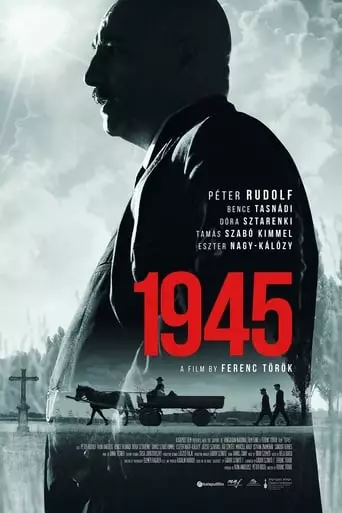An unsettling feeling overwhelms a small Hungarian town when two orthodox Jews arrive with a mysterious trunk. As residents begin to speculate on the purpose of the visit of these two strangers, order starts to crumble in town with some pursuing devious plans and others finding remorse in their hearts.
1945 is a 2017 Hungarian drama directed by Ferenc Török, set in a small Hungarian village during the immediate aftermath of World War II. The film opens with the arrival of two Orthodox Jewish men at the local train station, carrying heavy trunks. Their presence disrupts the village’s routine, as the residents are apprehensive about their intentions. The narrative unfolds over a single day, revealing the villagers’ secrets and the moral complexities of their past actions during the war.
As the two men make their way through the village, the film delves into the villagers’ reactions, exposing their guilt, denial, and attempts to conceal their wartime complicity. The tension escalates as the villagers’ past transgressions come to light, leading to a confrontation that forces them to confront their actions and the consequences of their choices. The film’s minimalist style and deliberate pacing create a contemplative atmosphere, encouraging viewers to reflect on themes of collective guilt and the moral ambiguities of human behavior.
Main Themes in 1945
- Collective Guilt and Responsibility: 1945 explores the theme of collective guilt, examining how communities grapple with the moral implications of their actions during wartime. The villagers’ attempts to suppress their past wrongdoings highlight the challenges of confronting collective responsibility.
- Moral Ambiguity: The film delves into the complexities of human morality, illustrating how individuals navigate ethical dilemmas in the face of survival and societal pressures. The villagers’ justifications for their actions reveal the nuanced nature of moral decision-making.
- The Legacy of War: 1945 examines the enduring impact of war on individuals and communities, focusing on how the aftermath continues to shape lives long after the conflict has ended. The film portrays the psychological scars and unresolved tensions that persist in the post-war period.
- Confrontation with the Past: The narrative centers on the villagers’ confrontation with their past actions, emphasizing the difficulty and necessity of facing historical wrongs. This theme underscores the importance of acknowledgment and reconciliation in healing and moving forward.
Impact of 1945
Upon its release, 1945 received critical acclaim for its poignant storytelling and exploration of complex moral themes. Critics praised the film for its subtle yet powerful narrative, highlighting its ability to provoke deep reflection on the human condition. The film’s minimalist approach and focus on character development were noted as strengths, contributing to its emotional depth. 1945 was recognized for its contribution to Holocaust cinema, offering a unique perspective on the aftermath of war and the moral reckoning that follows.
7 Reasons to Watch 1945 (2017)
- Thought-Provoking Exploration of Morality: 1945 offers a profound examination of moral complexities, prompting viewers to reflect on the nature of guilt, responsibility, and ethical decision-making. The film’s nuanced portrayal of human behavior encourages deep contemplation of personal and collective morality.
- Minimalist Cinematic Style: The film’s minimalist approach enhances its emotional impact, using sparse dialogue and lingering shots to convey the weight of the narrative. This style allows viewers to immerse themselves in the atmosphere and themes without distraction.
- Strong Performances: The cast delivers compelling performances, with each actor effectively conveying the internal struggles and moral dilemmas of their characters. The subtlety and depth of the performances contribute significantly to the film’s emotional resonance.
- Historical Significance: 1945 provides insight into the immediate post-war period in Hungary, shedding light on the societal and moral challenges faced by communities in the aftermath of conflict. The film offers a window into a lesser-explored aspect of history, enriching viewers’ understanding of the era.
- Atmospheric Cinematography: The cinematography captures the stark beauty of the Hungarian countryside, using the setting to reflect the themes of the film. The visual composition enhances the storytelling, creating a contemplative and immersive experience.
- Engaging Narrative Structure: The film’s real-time narrative unfolds over a single day, building tension and suspense as the story progresses. This structure keeps viewers engaged, with each moment contributing to the unfolding drama.
- Cultural and Educational Value: Beyond its artistic merits, 1945 serves as an educational tool, prompting discussions about history, morality, and the human experience. The film encourages viewers to consider the long-term effects of war and the importance of confronting historical injustices.
How Will You Feel After Watching 1945?
After watching 1945, viewers are likely to experience a range of emotions, including introspection, empathy, and perhaps discomfort. The film’s exploration of moral complexities and collective guilt may prompt self-reflection on personal values and societal responsibilities. The subdued yet powerful storytelling leaves a lasting impression, encouraging contemplation of the human capacity for both good and evil. The film’s thought-provoking themes and emotional depth may lead to a sense of unease, as it challenges viewers to confront uncomfortable truths about history and human nature. Overall, 1945 offers a poignant and contemplative cinematic experience that lingers long after the credits roll.

